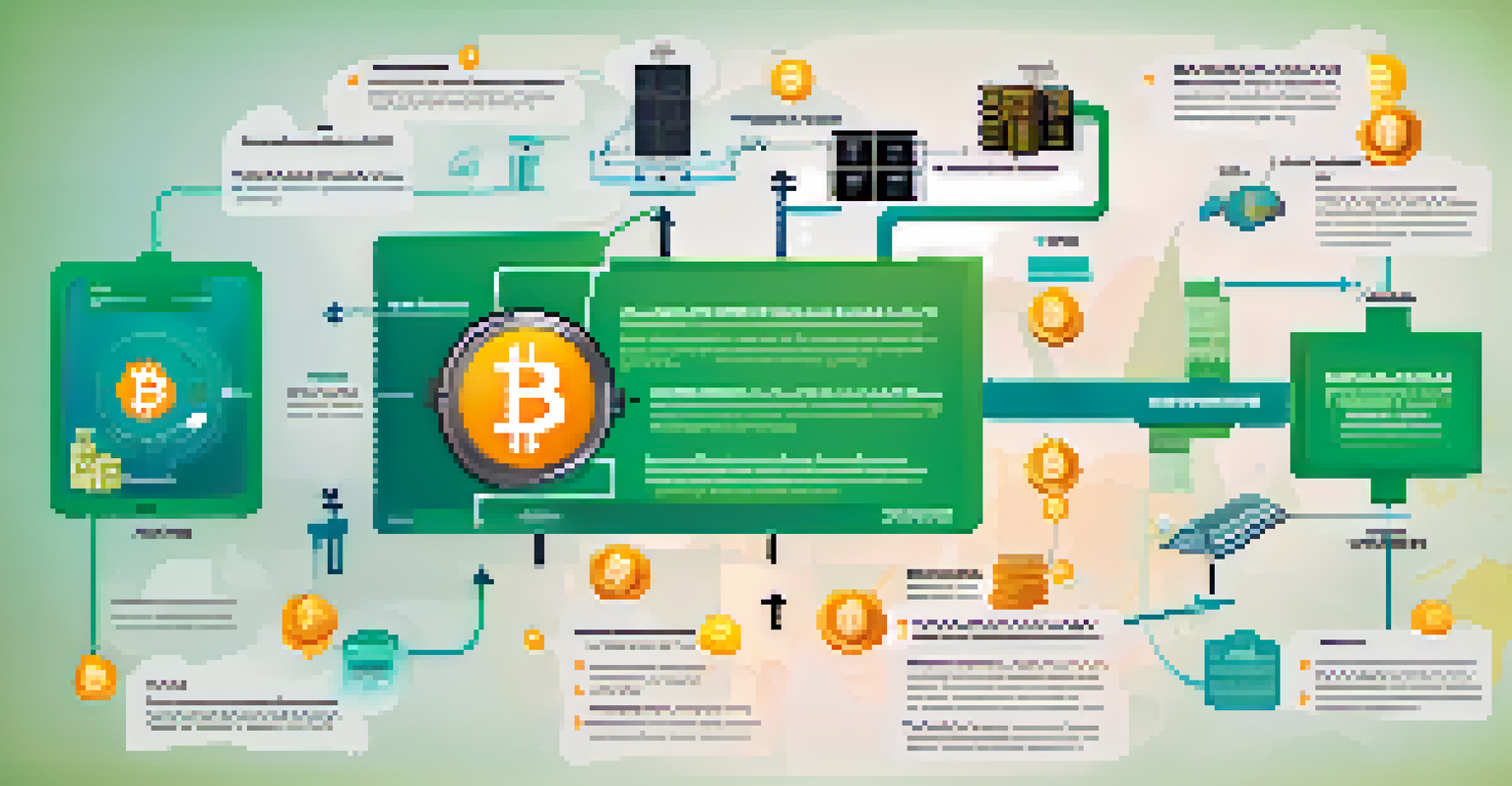Tax Reporting for Bitcoin Mining: Key Considerations

Understanding Bitcoin Mining and Its Tax Implications
Bitcoin mining is the process of validating transactions on the blockchain, which can be both rewarding and complex. When individuals or businesses engage in mining, they generate Bitcoin, which is treated as income for tax purposes. This income can significantly impact your tax return, making it crucial to understand the implications early on.
Bitcoin is a technological tour de force.
Mining operations can vary greatly in scale—from hobbyist setups to large commercial enterprises—each with different tax obligations. The IRS considers mined Bitcoin as ordinary income, meaning it must be reported in the year it was mined. This is essential for compliance and to avoid potential penalties later on.
Moreover, the value of Bitcoin can fluctuate wildly, affecting how much tax you owe. For example, if you mine Bitcoin when it’s valued at $20,000 and sell it when it’s valued at $25,000, you’ll need to report the income based on the fair market value at the time of mining, not the sale. This dynamic nature of crypto values adds a layer of complexity to tax reporting.
Tracking Your Mining Income for Accurate Reporting
Accurate tracking of your mining income is vital for fulfilling tax obligations. Keeping detailed records of the dates you mined, the amount of Bitcoin received, and its value at that time can simplify the reporting process. Tools and software specifically designed for cryptocurrency tracking can be incredibly helpful.

In addition to tracking income, document any expenses related to your mining operations, such as electricity costs, hardware purchases, and maintenance fees. These expenses can often be deducted, reducing your taxable income. A comprehensive approach to documentation can lead to significant tax savings.
Tax Implications of Bitcoin Mining
Mining Bitcoin generates income that must be reported for tax purposes, with varying obligations based on the scale of operations.
For instance, if you spent $1,000 on electricity and mined Bitcoin valued at $10,000, you’d only report $9,000 as taxable income, assuming those expenses are allowable deductions. This highlights the importance of not just tracking income but also understanding what counts as an expense.
The Importance of Reporting Cryptocurrency Gains and Losses
When you sell or exchange your mined Bitcoin, reporting capital gains or losses becomes essential. The IRS treats the sale of Bitcoin as a taxable event, meaning you must report any profit made from selling your mined Bitcoin. This applies even if you were to exchange Bitcoin for other cryptocurrencies.
In the long run, the value of a cryptocurrency is determined by how much it is used and how much value it brings to its users.
To calculate your capital gains, you’ll need to know your cost basis—the original value of the Bitcoin when mined. If you mined Bitcoin when it was worth $15,000 and sold it for $20,000, you would report a $5,000 gain. However, if the market drops, you might realize a loss, which can be useful for offsetting gains from other investments.
This process can be tricky due to the fluctuating nature of Bitcoin prices, but careful record-keeping will ease the burden. Utilizing tools that provide detailed transaction histories can help you keep track of your investments, ensuring you don’t miss reporting any gains or losses.
Tax Treatment of Mining Equipment and Expenses
When it comes to mining, your equipment is not just a cost; it can also have tax implications. Mining rigs, cooling systems, and other hardware can often be depreciated over time, allowing you to deduct a portion of their costs each year. This can significantly reduce your taxable income.
For example, if you invested $5,000 in mining equipment, you might be able to deduct a portion of that cost each year based on its useful life. This method of capitalizing on equipment costs can lead to substantial tax savings over the long term.
Track Income and Expenses Diligently
Keeping meticulous records of mining income and related expenses is crucial for accurate tax reporting and potential deductions.
However, it’s essential to consult with a tax professional to understand the specific rules regarding depreciation and deductions for your particular situation. Each jurisdiction may have different regulations that apply to cryptocurrency mining, so staying informed is crucial.
State-Specific Tax Regulations for Bitcoin Mining
While federal tax regulations apply, it’s vital to also consider state-specific tax laws that may impact your mining activities. Different states have varying tax rates and rules regarding income from Bitcoin mining, which can affect your overall tax burden. Researching your state’s regulations is essential for compliance.
For example, some states have embraced cryptocurrency and offer tax incentives for mining operations, while others may impose higher taxes on crypto income. This could influence your decision on where to establish your mining operations, as a favorable tax environment can enhance profitability.
Being proactive about understanding state regulations can save you money and help you avoid legal issues. Engaging with local tax professionals who specialize in cryptocurrency can provide invaluable insights tailored to your location.
Navigating IRS Guidelines for Cryptocurrency Taxation
The IRS has issued guidelines specifically for cryptocurrency, making it crucial for miners to stay informed about their obligations. In 2014, the IRS classified Bitcoin as property, which means it’s subject to capital gains tax. This distinction is important for miners as it affects how income and gains are reported.
Understanding IRS guidelines can help you avoid common pitfalls and ensure compliance. For instance, failing to report mined Bitcoin can lead to audits and penalties, making it imperative to accurately report your activities. Regularly checking the IRS website for updates on guidance can keep you informed.
Consult a Tax Professional for Guidance
Engaging a tax expert can help navigate the complexities of cryptocurrency taxation and ensure compliance with all regulations.
Additionally, the IRS has become increasingly focused on cryptocurrency transactions, so being diligent in your reporting is essential. Utilizing professional tax services that specialize in cryptocurrency can provide peace of mind and help you navigate these complex regulations.
The Benefits of Consulting a Tax Professional
Given the complexities of tax reporting for Bitcoin mining, consulting a tax professional can be a wise investment. A tax expert familiar with cryptocurrency can help you understand your specific obligations, identify potential deductions, and ensure compliance with both federal and state laws. This can save time and reduce the risk of costly mistakes.
For instance, tax professionals can provide insights into the best ways to structure your mining operation for tax efficiency. Whether it’s through proper expense tracking or utilizing specific tax strategies, their expertise can lead to significant savings.

Moreover, as tax regulations surrounding cryptocurrency continue to evolve, having a knowledgeable professional on your side can help you stay ahead of any changes. This proactive approach can provide peace of mind, allowing you to focus on your mining operations without the stress of tax season looming overhead.